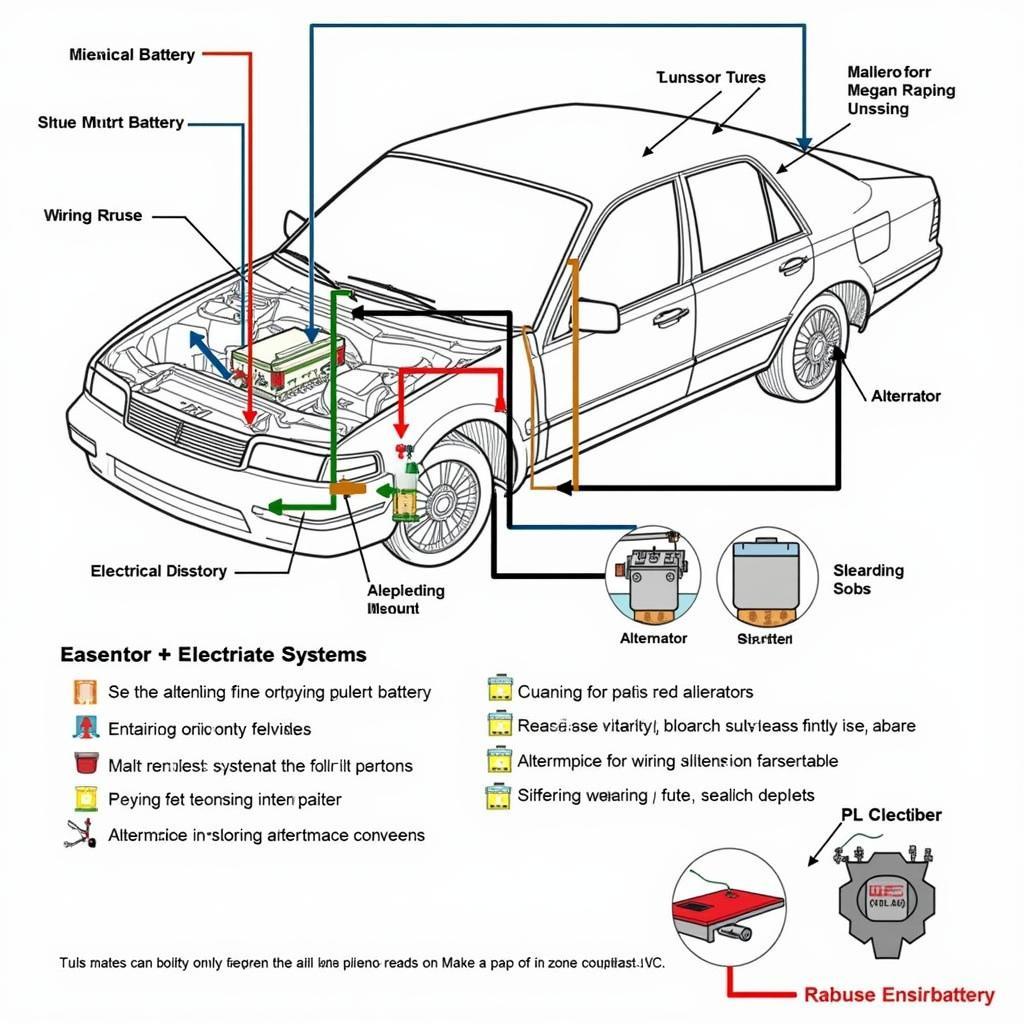Electrical problems in cars can be a major pain point, leaving you stranded on the side of the road or facing hefty repair costs. Understanding what constitutes an electrical problem and how to diagnose it is essential for any car owner. This guide will provide you with a comprehensive overview of common car electrical issues, their causes, and how to troubleshoot them.
Common Electrical Problems in Cars
A wide range of electrical problems can arise in your car, but some of the most common include:
- Dead Battery: A dead battery is often the culprit behind a car that won’t start. This could be due to a faulty battery, a problem with the charging system, or excessive parasitic drain.
- Dim or Flickering Lights: Issues with the electrical system can manifest as dim or flickering lights, which may be a sign of a faulty bulb, wiring problems, or a failing alternator.
- Malfunctioning Power Windows: A problem with the power window system can lead to windows that won’t go up or down, or that get stuck halfway. This may be due to a broken switch, faulty motor, or damaged wiring.
- Electrical System Overload: Overloading the electrical system can lead to various problems like blown fuses, overheating, and even a fire. This often occurs when too many electrical accessories are plugged in or the system is improperly wired.
- Problems with the Starter Motor: A faulty starter motor will prevent your car from starting. This could be due to a worn-out starter motor, a broken starter solenoid, or a problem with the electrical connections.
- Engine Not Starting: A variety of electrical issues can cause the engine to fail to start, such as a dead battery, a faulty starter, or problems with the ignition system.
- Electrical System Malfunctions: A malfunctioning electrical system can cause a range of symptoms, from erratic dashboard lights to non-functional accessories. This may indicate a problem with the wiring, a faulty component, or even a computer issue.
 Car Electrical System Diagram
Car Electrical System Diagram
What Causes Car Electrical Problems?
Several factors can contribute to electrical problems in your car, including:
- Age and Wear: Like any other component of your vehicle, electrical components wear out over time. Worn-out wiring, corroded connectors, and failing components can lead to a variety of electrical problems.
- Corrosion: Corrosion caused by exposure to moisture, salt, or other elements can damage electrical components and wiring, leading to malfunctions.
- Environmental Factors: Extreme temperatures, humidity, and dirt can all affect the performance of electrical components, leading to malfunctions.
- Improper Installation or Modification: Improperly installed or modified electrical components can cause problems with the electrical system, potentially leading to short circuits or even fires.
- Accidents or Damage: Accidents or damage to the vehicle’s electrical system can cause a wide range of electrical problems.
How to Diagnose Electrical Problems in a Car
Diagnosing electrical problems can be challenging for the average car owner. Here’s a step-by-step guide:
- Check the Battery: Start by checking the battery voltage with a voltmeter. A healthy battery should read around 12.6 volts when not charging. If the battery is low or showing signs of corrosion, it may need to be replaced.
- Inspect the Fuses: Blown fuses are a common cause of electrical problems. Check the fuse box for blown fuses and replace any that are faulty.
- Examine the Wiring: Look for any signs of damaged, corroded, or loose wiring. Repair or replace any faulty wiring.
- Test the Electrical Components: Test the electrical components that are malfunctioning, such as the lights, power windows, or starter motor. This can help you pinpoint the source of the problem.
- Use a Diagnostic Tool: For more complex electrical problems, you may need to use a diagnostic tool, such as an OBD-II scanner. These tools can help you read diagnostic trouble codes (DTCs) that can provide clues about the problem.
Tips for Preventing Car Electrical Problems
You can take steps to prevent electrical problems in your car:
- Regular Maintenance: Regular car maintenance is crucial for preventing electrical problems. This includes having the battery checked and cleaned regularly, as well as inspecting the wiring and electrical components for signs of damage.
- Use Quality Parts: When replacing electrical components, use high-quality parts to ensure they are reliable and long-lasting.
- Avoid Overloading: Don’t overload the electrical system by plugging in too many accessories.
- Protect Against Moisture: Take steps to protect the electrical system from moisture, such as using a car cover when parked outdoors.
Conclusion
Electrical problems in your car can be frustrating and costly, but they’re often avoidable with regular maintenance and careful attention to the electrical system. By understanding common electrical problems, their causes, and how to diagnose them, you can take steps to keep your car running smoothly.
If you’re facing an electrical problem that you can’t diagnose or fix yourself, it’s best to seek the help of a qualified mechanic.
For any car electrical problems you encounter, don’t hesitate to contact us at AutoTipPro. Our team of experienced technicians is dedicated to providing expert advice and solutions to your car’s electrical issues.
Contact Us:
Phone: +1 (641) 206-8880
Office: 500 N St Mary’s St, San Antonio, TX 78205, United States
FAQ
Q: What are the most common signs of an electrical problem in a car?
A: Some common signs include a dead battery, dim or flickering lights, malfunctioning power windows, electrical system overload, problems with the starter motor, and the engine not starting.
Q: What are the most common causes of electrical problems in a car?
A: Common causes include age and wear, corrosion, environmental factors, improper installation or modification, and accidents or damage.
Q: Can I fix electrical problems in my car myself?
A: Some minor electrical issues can be fixed by a knowledgeable car owner, but for more complex problems, it’s best to consult a qualified mechanic.
Q: How can I prevent electrical problems in my car?
A: You can prevent electrical problems by performing regular maintenance, using quality parts, avoiding overloading the system, and protecting against moisture.
Q: What is the best way to diagnose electrical problems in a car?
A: A combination of visual inspection, checking fuses, testing components, and using a diagnostic tool can help pinpoint the source of the problem.
Q: What should I do if I suspect my car has an electrical problem?
A: If you suspect an electrical problem, it’s important to address it promptly. A qualified mechanic can diagnose the issue and provide the necessary repairs.





Leave a Reply